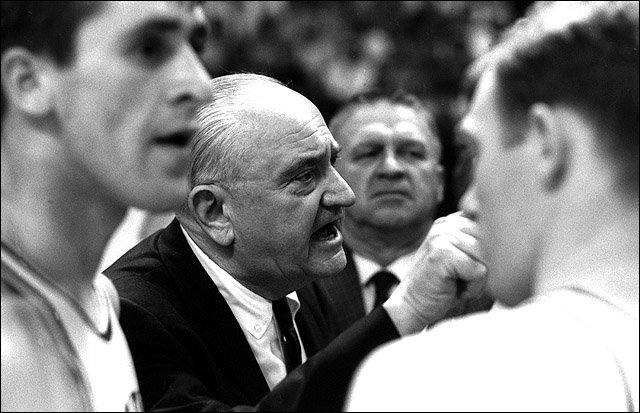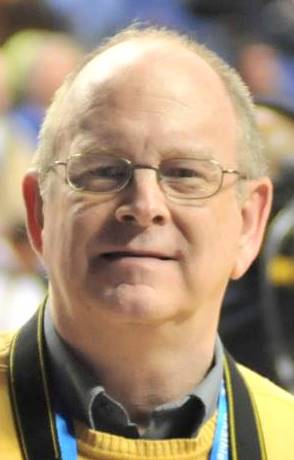Over several decades, there have been many national articles about Adolph Rupp and his 1965-66 Wildcats, popularly called “Rupp’s Runts.”
That team, of course, featured three All-Americans – Louie Dampier, Pat Riley and Thad Jaracz – and All-SEC performers Larry Conley and Tommy Kron in the starting lineup. The tallest starter was the 6-foot-5 Jaracz.
But some of articles – print, online and television/radio – haven’t been all that flattering to Rupp and UK, focusing primarily on Texas Western’s all-black starters against Kentucky’s all-white team in the National Championship game. Of course, there have been more discussion lately, celebrating 50th anniversary of Texas Western’s stunning upset of the top-ranked Wildcats.

And Rupp often was portrayed in an unfavorable light, especially when it comes to a very sensitive topic of racism. Sometimes the media, especially on the national level and the younger ones, don’t seem to understand or know what they are talking about. Remember the ex-Wildcat coach even had a black starter on his high school team in Illinois and also had one on the 1948 U.S. Olympic hoops squad when he served as an assistant? And there are several other facts that supported Rupp, too.
I’m not saying Rupp was perfect, but the criticism, I think, has been unfair for the most part.
While I personally didn’t know Coach Rupp, who was the country’s winningest college basketball coach with 876 victories for many years, I saw him coach at UK several times in the late 1960s and early 1970s when I was a young kid growing up in Science Hill, a small town in Pulaski County. And I interviewed a handful of former Wildcat players and media folks who knew Rupp when I worked on my four books on UK basketball during the 1990s and early 2000s.
Most Rupp defenders say he was simply a product of his environment or surroundings.
NBC broadcaster and Lexington native Tom Hammond has said that today’s perception of UK’s past and Rupp is inaccurate and unfair.
“It has now become set in stone,” Hammond commented in 1997. “It has now become accepted that Kentucky has a racist basketball past. That is how that has evolved. That is completely unfair, but that is the way the national media looks at it. (KyForward columnist) Billy Reed and I have talked about this before and we share the same opinion that it’s an unfair analysis.”
On the other hand, though, Hammond said Rupp – who only had one African-American player (Tom Payne) on scholarship during his UK career — could’ve done more to be a pioneer in integration. “He was simply a product of his time,” he explained.
Tennessee’s Ray Mears, who was one of Rupp’s coaching rivals, didn’t believe the Man in the Brown Suit was a racist.
Mears said it was probably unfair to call Rupp a racist when some of the SEC coaches didn’t have a black scholarship player on the roster practically at the same time. Otherwise, Mears said, everyone was a racist.
Said former WKYT-TV (Channel 27 in Lexington) sports director Denny Trease, “I don’t believe it is a fair statement. In fact, I think a lot of unfair things have been said about Adolph Rupp through the years. He was always very, very kind to me. Always a gentleman and I just had a lot of respect and love for the man, to tell you the truth.
“And it hurts me every time I hear people talk negatively about the man. He could be harsh at times. He could, you know, have an acid tongue at times. But I think he also had a big heart. I wish more people had known him better.
“(Portraying Rupp in negative light) really is a mystery to me. You know there is still some sentiment throughout the South that there was racism going on and I don’t doubt that. But I think that to pick out one man and say that Adolph Rupp was a racist and ignore some of the other things that were going on is just plain wrong.”
Dan Issel, the men’s all-time leading scorer at UK who played for Rupp, added, “In 1970, in Lexington, Ky., in the South, his attitude toward the differences in the races wasn’t much different than what everybody else – all other white men – thought about at the time. By today’s standards, coach Rupp was probably a racist, but I would say every white person in the South in the 1950s and the 1960s was a racist.”
Former Knoxville sportswriter Ben Byrd supports Rupp.
“That’s absurd,” he said of such racism charges. “That’s the way it was then. If he was a racist, every coach in the conference and most of them in the country were racist. That is ridiculous.
“….. (But) the transformation (on race relations) has taken place and things are different now and that’s good.”
Jack Givens, one of UK’s first black basketball players, came to Kentucky shortly after Rupp had retired. A former Wildcat All-American, Givens said what he knew about Rupp was what he had heard from the black community in Lexington and the discussion wasn’t positive.
Givens commented he wish had the chance to sit down with Rupp and hear his side of everything, but the coach was in poor health at the time.
Larry Conley, a former Wildcat standout who covered college basketball for many years as a regional and national television sportscaster, said, “It’s always been my policy that nobody is ever as bad as you think they are. They are somewhere in between and the thing that bothers me the most about what they write about (Rupp) is the fact that they don’t balance it up. They give an awful bad side, but there was a good side, too.”
Anyhow, Rupp – who had a master’s degree from Columbia University — was a complex man who often kept his gentle side hidden in public. He was a man of many dimensions. The Hall of Fame coach was called many things such as gruff….funny….smart….powerful…. arrogant….disciplinarian….controlling… racist….kind-hearted…mean…demanding….colorful….master of psychology.
In an interview many years ago at his Lexington home, Rupp’s only child, Herky Rupp, said, “My father was a brilliant man. You don’t find many people walking around with a master’s degree from Columbia University. Daddy read all the time, and I’ll say it – he could have been anything he wanted to be. I have no idea what his IQ was, but it had to be very high.
“When he left (Memorial) Coliseum, he left basketball there. He came home in the evening and he did not particularly care to watch television. He thought it was a waste of time. He would read many things (including news-oriented magazines). He would read books. He was very big in cattle. He was 16-consecutive term president of the Kentucky Hereford Association.
“His image and demeanor on the floor were entirely different than they were at home. We had an excellent, close relationship.”
That’s the side of Rupp – who passed away in 1977 at the age of 76 — that many folks don’t see or read much about.
Nevertheless, Rupp is a legendary figure who should’ve been treated better or more fairly, especially from the national media folks.
Jamie H. Vaught, a longtime columnist in Kentucky, is the author of four books about UK basketball. He is the editor of KySportsStyle.com magazine and a professor at Southeast Kentucky Community and Technical College in Middlesboro. You can follow him on Twitter @KySportsStyle or reach him via e-mail at KySportsStyle@gmail.com.


















